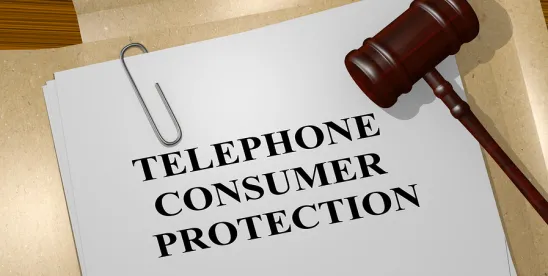The Supreme Court recently signaled a further shift away from judicial deference to administrative rulings. The question of whether the Telephone Consumer Protection Act (TCPA or “the Act”) covers online faxes (think your email inbox) in addition to standard paper faxes (think old paper scrolls) has divided federal courts for years. Compare Urgent One Med. Care, PC v. Co-Options, Inc., 2022 WL 16755154, at *6 (E.D.N.Y. June 1, 2022) (TCPA covers online faxes) and Ambassador Animal Hosp., Ltd. v. Hill’s Pet Nutrition, Inc., 2021 WL 3043422, at *1 (N.D. Ill. Feb. 17, 2021) (TCPA covers faxes sent to computers in addition to traditional fax machines) with Licari Family Chiropractic, Inc. v. Eclinical Works, LLC, 2021 WL 4506405, at *5 (M.D. Fla. Jan. 11, 2021) (the TCPA does not apply to online fax services) and Advanced Rehab & Med., P.C. v. Amedisys Holding, LLC, 2020 WL 4937790, at *3 (W.D. Tenn. Aug. 24, 2020) (same).
While many defendants had hoped that the Supreme Court would endorse the agency view that precluded TCPA actions based on faxes that, for example, were sent to email accounts, the Supreme Court has left that question open on remand in its recent decision in McLaughlin Chiropractic Associates, Inc. v. McKesson Corp., 606 U.S. ___ (2025). This means that companies and retailers will need to evaluate their own risk tolerance under the TCPA as lower courts continue to evaluate, without being bound by the Federal Communications Commission (FCC), whether online faxes can constitute advertisements under the Act. Moreover, the Supreme Court’s decision opens the door for challenges to prior FCC interpretation of the TCPA generally.
From Chevron to McKesson: Shrinking Scope of Agency Deference
In 2014, McLaughlin sued McKesson in the Northern District of California, arguing McKesson violated the TCPA by faxing unsolicited advertisements both through a traditional fax machine and through online fax services such as email or an online portal. In an unrelated 2019 declaration, the FCC ruled that “an online fax service is not a ‘telephone facsimile machine.’” In re Amerifactors Financial Group, LLC, 34 FCC Rcd. 11950, ¶ 11 (2019) (declaratory ruling). The Northern District of California held that it was bound by the FCC’s ruling and that McKesson was entitled to summary judgment on McLaughlin’s claims involving alleged TCPA violations associated with online fax services. True Health Chiropractic, Inc. v. McKesson Corp., No. 13-cv-2219 (N.D. Cal., Dec. 24, 2020). The Ninth Circuit affirmed and agreed that the District Court was bound by the FCC’s ruling. True Health Chiropractic, Inc. v. McKesson Corp., No. 22-15710, 2023 WL 7015279 (9th Cir. Oct. 25, 2023). The Supreme Court reversed, holding that the district court is not bound by the FCC’s interpretation of the TCPA, and left the issue of whether online faxes fall under the TCPA open on remand.
The Supreme Court’s ruling further erodes agency deference and establishes a new default rule for statutes that allow for pre-enforcement review, which it divides into three categories. First, there are statutes, such as the Clean Water Act, which expressly preclude judicial review following the pre-enforcement review process. The Court ruled that, by their very nature, these statutes cannot be subject to judicial review once the pre-enforcement period has elapsed. On the other end of the spectrum are statutes that expressly authorize review in subsequent enforcement proceedings, such as the Toxic Substances Control Act. In between these two categories are statutes that neither expressly preclude nor authorize judicial review in subsequent enforcement proceedings, such as the Hobbs Act at issue in McKesson. The Court held that, in the absence of clarifying language, district courts are allowed to review an agency’s statutory interpretation even after the pre-enforcement review period has elapsed. Put differently, the expectation moving forward is that judicial review of statutory interpretation will be permitted absent specific statutory language to the contrary.
The Court based its decision on a presumption of judicial review codified in Section 703 of the Administrative Procedure Act, which provides that “[e]xcept to the extent that prior, adequate, and exclusive opportunity for judicial review is provided by law, agency action is subject to judicial review in civil or criminal proceedings for judicial enforcement.” (emphasis in original.) The Court emphasized that “the default rule is only a default, meaning that it applies only absent congressional indication otherwise.” Finally, the Court reasoned that its ruling would limit unfairness, as many entities subject to agency rules or orders may not realize they are impacted until after the pre-enforcement review period ends.
The McKesson decision represents another example of the Court placing less weight on administrative rulings. It is not difficult to see the through line between McKesson and the Supreme Court’s decision in Loper Bright Enterprises v. Raimondo, which ended Chevron deference almost a year to the day before the McKesson ruling. 603 U.S. 369 (2024). In addition, the McKesson opinion quotes Corner Post, Inc. v. Board of Governors, another recent Supreme Court decision that extended the statute of limitations for which an agency’s rules can be challenged for the notion that “parties may always assail a regulation as exceeding the agency’s statutory authority in enforcement proceedings against them.” 603 U.S. 799, 823 (2024). The Court’s apparent preference to give less credence to administrative rulings warrants further monitoring as more decisions percolate, and it is a fair expectation that the Court will continue to redistribute authority away from administrative agencies moving forward.
McKesson’s Impact on the TCPA Litigation Landscape
The FCC has issued numerous orders and declaratory rulings interpreting the decades old TCPA and its application to modern technology. See, e.g., In Re Rules & Reguls. Implementing the Tel. Consumer Prot. Act of 1991, 18 F.C.C. Rcd. 14014, 14115 (2003) (the TCPA applies to both audio calls and text messages); In re Rules and Reguls. Implementing the Tel. Consumer Prot. Act of 1991, CG Docket No. 02-278, Declaratory Ruling, DA 20-670 (rel. June 25, 2020) (peer-to-peer texting platforms do not constitute autodialer technology if certain requirements are met); In the Matter of Implications of Artificial Intelligence Technologies on Protecting Consumers from Unwanted Robocalls and Robotexts, CG Docket No. 23-362, Declaratory Ruling, FCC 24-17 (rel. Feb. 8, 2024). The FCC’s statutory determinations regarding the TCPA have generally been viewed as settled and have provided companies and retailers with guidance for interpretation of the TCPA. However, the Supreme Court’s ruling in McKesson renders the FCC’s prior determinations as ripe for scrutiny and challenge in courts across the country. Although the Supreme Court’s decision in McKesson advises district courts to afford “appropriate respect to the agency’s interpretation,” they are “not bound by” it and are advised to interpret the TCPA under ordinary principles of statutory interpretation. This development not only opens the door for plaintiffs to argue for expanded protections under their interpretation of the TCPA but also allows for defendants to argue for a more limited scope of the Act and the ability to raise defenses that may have been foreclosed by prior FCC interpretation.
We predict increased litigation as a result of the uncertainty surrounding TCPA interpretation and will continue to monitor and report on developments regarding TCPA interpretation and the FCC’s role in the space. In the meantime, parties should pay careful attention to the law in their respective circuit, recognizing that FCC authority alone is not binding.





 />i
/>i
